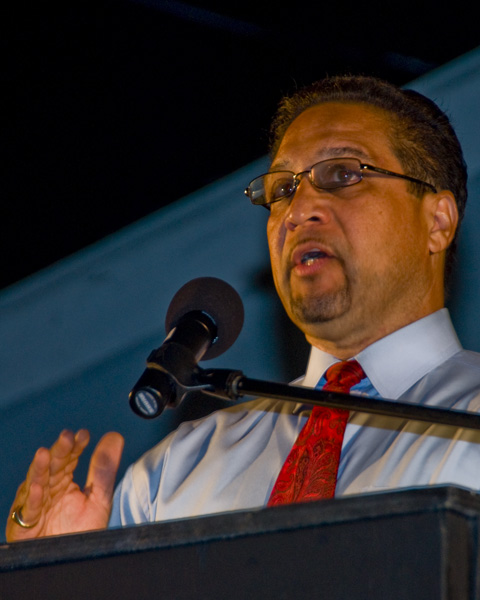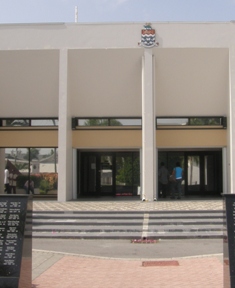Archive for October, 2010
Ministry denies further delays over school projects
(CNS): Despite the fact that there appears to be no work going on at either of the construction sites for the government’s two new high schools and the remaining subcontractor has left the job, the Education Ministry denied that the projects were subject to any further delays on Wednesday. Re-confirming that Caribbean Mechanical (High Schools 2008) Limited (CMHSL) were leaving the work sites, the ministry claimed that the relationship between the Cayman Islands Government (CIG) and the sub-contractor had always been an interim one. In a second statement in a week on the school projects, the ministry again stated that the new construction management team was expected to mobilise shortly.
The ministry said the departure of subcontractor CMHSL was part of the anticipated transition process of both projects by the new construction management team.
"The Cayman Islands Government (CIG) and Caribbean Mechanical (High Schools 2008) Limited (CMHSL) have mutually agreed to terminate their interim relationship, which was forged in the immediate aftermath of the general contractor’s departure," the ministry stated. ‘It is anticipated that the new construction management team will shortly mobilise. Work at the project sites will increase to full capacity under their supervision."
Following the departure of Tom Jones International from the school projects in October 2009 as a result of s dispute between it and government, CMHSL, a sub contractor which has been one of the leading work groups on the site since its inception, returned to the sites at the beginning of 2010 to maintain the integrity of the work already done.
At that time government explained it had assumed responsibility for the CMHSL contracts to ensure the continuation of certain work at the project sites, pending the appointment of a new construction management team.
"Both parties anticipated that this interim arrangement would be terminated at an appropriate time, and this is exactly what the parties have now agreed to do," the ministry said in the official statement.

Law Reform Commission says don’t limit claims
 (CNS): Following a request by the minister of health to reform the country’s tort laws to put caps on personal injury awards and to limit the time period in which they can be made, the Law Reform Commission (LRC) has recommended against it. Opening the review of the law for public debate and consultation, the LRC has published its findings and recommendations and is now seeking comment. The pressure for reform has come as a result of escalating fees for doctors’ insurance cover because of a number of high awards. However, in its provisional recommendations the LRC has warned that capping claims does not necessarily remove the problem of increasing premiums but can undermine access to justice for those who have suffered because of medical malpractice.
(CNS): Following a request by the minister of health to reform the country’s tort laws to put caps on personal injury awards and to limit the time period in which they can be made, the Law Reform Commission (LRC) has recommended against it. Opening the review of the law for public debate and consultation, the LRC has published its findings and recommendations and is now seeking comment. The pressure for reform has come as a result of escalating fees for doctors’ insurance cover because of a number of high awards. However, in its provisional recommendations the LRC has warned that capping claims does not necessarily remove the problem of increasing premiums but can undermine access to justice for those who have suffered because of medical malpractice.
The LRC has instead proposed introducing a standard of care in medical negligence; establishing an expert witness rule and introducing alternative dispute resolution rather than limiting the court’s hand and claimants’ access to justice.
In their preliminary findings the law reformers said research suggests that there is no solid empirical evidence that limiting claims will alleviate the problems in the insurance markets but that it will impact access to justice. “The appropriate approach should strike a balance between responding to the concerns of reasonable critics about civil law remedies whilst affording relief to those who suffer as a result of serious and perhaps avoidable mistakes in the provision of health care,” the reformers said in their report
The pressure for reform has come from the Cayman Islands Medical and Dental Society as a result of escalating Medical Protection Society subscription rates for practising obstetricians and gynaecologists, which provides their professional indemnity cover. A 400 percent increase in annual premiums had been proposed by the MPS as a result of local judgment award precedents in personal injury cases and a number of unresolved malpractice claims pending in the courts of the Cayman Islands arising from the mismanagement of new born deliveries.
In the process of its review the LRC examined the proposals put forward by the Ministry of Health to impose legislative caps on the award of non-economic damages in cases of personal injury, with a particular emphasis on medical malpractice, and to reduce the limitation periods applicable to the time frame within which an aggrieved party may pursue a claim for damages.
The paper may be viewed on www.gov.ky Submissions should be submitted in writing no later than 19 November 2010 to the Director, Law Reform Commission, c/o Government Administration Building and may be posted, delivered by hand to the offices of the Commission on 3rd Floor Anderson Square or emailed to cheryl.neblett@gov.ky.

Immigration board policies to go public, Mickey hears
 (CNS): Despite long held perceptions that some immigration board decisions are made based on anonymous complaints or ‘poison pen letters’, the board has revealed in a recent freedom of information request by Mickey Mouse that none of the immigration boards are supposed to consider anonymous correspondence against applicants. The information manager has also said that the boards are in the process of putting all of their policies in writing, which will soon be available on the website for everyone to see. The FOI revealed that the draft policy document for dealing with complaints states that only written and signed complaints can be considered.
(CNS): Despite long held perceptions that some immigration board decisions are made based on anonymous complaints or ‘poison pen letters’, the board has revealed in a recent freedom of information request by Mickey Mouse that none of the immigration boards are supposed to consider anonymous correspondence against applicants. The information manager has also said that the boards are in the process of putting all of their policies in writing, which will soon be available on the website for everyone to see. The FOI revealed that the draft policy document for dealing with complaints states that only written and signed complaints can be considered.
If the complaint against a work permit applicant is signed then the person being complained about has to be informed, and if the complainant is not prepared to disclose the details of the complaint openly then again it is not considered during the board’s deliberations.
When a complainant is prepared to stand by their complaint, according to the policy the applicant will see the details of the complaint, the evidence against them and be provided with an opportunity to respond. The draft policy reveals that boards will then consider both sides before making a decision.
With the advent of freedom of information both work-permit holders and their employers making the application are entitled to request the details of their files and all of the decisions made about them to see what weight a board gives to complaints.

MLAs call for more fee cuts
 (CNS): Both the opposition and the independent legislative members expressed disappointment on Tuesday over government’s decision to reduce only the cost of key employee applications and no other work permit related fees. In the wake of government’s announcement on Monday that it was halving the fee employers will have to pay to secure key status for staff, Ezzard Miller said he was dumbfounded that government would choose to reduce the one fee of least assistance to Caymanians. His legislative colleague and opposition frontbencher Alden McLaughlin said the PPM was also disappointed that, having recognised the damage the fee increases are doing to business, government would choose to reduce only this fee and called for an across the board fee reduction.
(CNS): Both the opposition and the independent legislative members expressed disappointment on Tuesday over government’s decision to reduce only the cost of key employee applications and no other work permit related fees. In the wake of government’s announcement on Monday that it was halving the fee employers will have to pay to secure key status for staff, Ezzard Miller said he was dumbfounded that government would choose to reduce the one fee of least assistance to Caymanians. His legislative colleague and opposition frontbencher Alden McLaughlin said the PPM was also disappointed that, having recognised the damage the fee increases are doing to business, government would choose to reduce only this fee and called for an across the board fee reduction.
McLaughlin said he would be filing a motion for the next sitting of the Legislative Assembly to ask government, yet again, to reduce fees as the increases were having the opposite affect intended by government. Instead of bringing in more revenue, the increases were stifling business and leading employers to cut staff rather than pay more fees.
“We said from the beginning that all the additional work permit fees, generally were going to have the opposite affect from that intended by the government, " McLaughlin told CNS. “More importantly, we warned that it would result in increased pressure on small businesses.”
Despite calls from the opposition and the independent member for North Side, Ezzard Miller, for government to reduce the fees and stimulate the local economy, the calls have gone unheeded until now.
“We are disappointed that when government finally recognises the damage the increase in fees has had, it has chosen to reduce only the key employee fee," McLaughlin said. “I am submitting a motion requesting that government reduce all of the fees associated with work permits now that it has recognised that the fee increases are an important issue.”
Miller also told CNS that he was very disappointed when he heard the news that from the entire fee reductions government could have made it chose to reduce the one that was of considerably less benefit to Caymanians than it was to foreign workers.
“What frustrates me, the thing I find confounding, is why the government continues to pass legislation that makes it harder for Caymanians to progress in the work place,” he said. “I have a moral obligation to represent the interests of the Caymanians who elected me. When are we going to make it easier for those people to get on in the work place rather than people who come here out of their own choice?" Miller asked rhetorically.
The North Side representative pondered the possibility that government members were getting very different representation from their constituents than the ones he received. He pointed out that none of his constituents were asking for a reduction in key employee fees but they were all asking for a reduction in the work permit fees for the staff needed in small businesses, such as bookkeepers.
Miller also issued a warning about the wider implications as key employee status became more common. He noted that the permanent residency board would find it increasingly difficult to turn down residency requests that will be made by those individuals when they reached the eligible time. Miller pointed out that the reasons that are given to justify key status are similar to those given for PR.
“It is going to get very difficult for the PR board to deny residency to these persons who have been designated key after one government board has conveyed such an important status on them,” Miller suggested.
The Legislative Assembly is set to resume next week, when immigration is likely to be only one of a number of controversial subjects before the House members.

Fund fraudster gets 8 years
(CNS): Robert Christopher Girvan was handed an eight year prison term by Justice Alex Henderson on Tuesday at the conclusion of his two day sentencing and confiscation hearing. Girvan, the former director, trader and fund manager of a collection of four Cayman Islands based hedge funds from which he stole more than $19 million, had pleaded guilty to over 21 counts of theft, fraud and money laundering as part of a complex web of deceit, woven to disguise a spiral of losses suffered by the funds. As he awarded the eight years for each of the offences which are to run concurrently, Henderson told the court that in such cases the issue of deterrence was of “paramount” importance in the sentencing.
Robert Christopher Girvan was handed an eight year prison term by Justice Alex Henderson on Tuesday at the conclusion of his two day sentencing and confiscation hearing. Girvan, the former director, trader and fund manager of a collection of four Cayman Islands based hedge funds from which he stole more than $19 million, had pleaded guilty to over 21 counts of theft, fraud and money laundering as part of a complex web of deceit, woven to disguise a spiral of losses suffered by the funds. As he awarded the eight years for each of the offences which are to run concurrently, Henderson told the court that in such cases the issue of deterrence was of “paramount” importance in the sentencing.
The offences all occurred between 2004 and 2009 when Girvan was the portfolio manager of a number of funds established by Naul Bodden, his business partner, and known collectively as the Grand Island Funds. Henderson said Girvan appeared to have had a free hand over the funds and had raised money from people to invest in the funds with the promise of impressive returns.
“His skills proved insufficient to the task,” Henderson said, as he described how Garvin began to misappropriate the money in the funds to try and conceal his losses.
The court had heard from Girvan’s own defence attorney, Ben Tonner, that as he began stealing from the funds in an effort to trade his way out of his earlier losses he was forced to conceal each loss with more misappropriation and deception, which led to the need to further conceal, and eventually the scheme spiralled out of control.
The offending therefore persisted for a significant period of four to five years and Girvan falsified bank statements and other documents, forged signatures of his business partner Bodden and transferred money through a complex web of accounts and commercial entities. Along with the millions of dollars which Girvan transferred into the trading accounts for the unauthorized trading, significant sums were also transferred to his personal accounts and used for real estate investments.
Of the almost $19 million that Girvan stole over the more than four year period, some $9 million was lost in unauthorized trading that Girvan could not bring himself to reveal to anyone.
Henderson pointed to the issues of trust in this case and the losses the investors had suffered as a result of Girvan’s major fraud. While some were sophisticated investors, aware of the high risk nature of such funds, some were not and he pointed to one investor who had trusted the defendant with her entire divorce settlement.
As he explained his sentence, Henderson said that there were no distinguishing features about Girvan’s particular offence compared to other similar cases that had been sighted during the hearing as authorities, but for the one notable exception of the significant sums involved.
Henderson said that he had to take into account all the traditional principles of sentencing, such as deterrence, safety of the public, punishment and rehabilitation but in this case, he said, deterrence was of paramount consideration. He indicated that he believed an appropriate starting point for the sentence was 11 years, but as Girvan had pleaded guilty he gave what he said was an appropriate discount, reducing the sentence to 8 years.
The judge also had made an order on Monday that more than $4.4 million be confiscated from Girvan after he realized his assets. He was given an 18 month time period in which to pay that sum back to the authorities. Henderson also made a deportation order for Girvan to be returned to Jamaica at the end of his sentence.
As he concluded his sentencing ruling, the judge pointed to the fact that Girvan had admitted his crime but had fallen short of offering his full cooperation to the police. Henderson said the investigators on the case, however, had done a good job in unravelling the complex web of financial transactions.
The FCU spent some eighteen months on the case, which eventually revealed the extent of Girvan’s crimes. Richard Clarke, the investigating officer, who was in court to hear the verdict, told CNS that an official statement regarding the result would be released by the RCIPS shortly.

Never Again?
Haverford College, my alma mater, went coed in 1980. This was considered a bold and controversial move at the time, but one that the school embraced as necessary for the way forward as an institution of higher learning.
Shortly after this change in admission policy (between 1980-1981), a young female freshman found herself intoxicated at a campus party. The degree of her intoxication is hard to ascertain and has been debated many times, but the reality is that it should never have mattered. Given her state, some older male upperclassmen saw what they thought to be an opportunity. One began to flirt with the girl, whom he then ushered to a more “private” room, and one by one this group of young men raped this young woman repeatedly. The rest of the story follows like the script from a cliché Lifetime film: she was “drunk”, female and Puerto Rican so clearly she must have asked for it; the boys were “good and upstanding” and said she consented; the situation became their word versus her’s, and she is said to have left the school before her freshman year was over.
Google it as you may, you will not find this story posted on the web. It is also not the administration of the school that makes new students aware of its existence and only a handful of professors choose to share it with their classes. It is the student body, year after year, generation after generation, who keeps its memory alive, tying our beloved school’s own sordid past with the ongoing efforts to eliminate violence against women from happening on our campus, our community and our world.
Many argue that Cayman is at a crossroads and that we need to decide, here and now, what path we will choose. The truth is that the choice has already been made. The fork in the road has long passed, and this is the path of complacency.
This is not a choice made solely by our leadership — political, religious and private sector — though they have had a role to play. It is not even solely our, the people’s, decision via our failing to hold said leadership accountable when, through their words and deeds they perpetuate the problem. It is a choice that we make, loud and clear, through our inaction and silence. In other words, the choice is not made “for” us but “by” us.
Do not misunderstand: there certainly are those among us who try. Yet year after year they find themselves preaching to the converted. Year after year they find themselves listening to the same empty promises, the same grandiose statements, watching the same show. They struggle to keep the fight alive, quietly on a day to day basis, but more loudly one month or even one day of the year when it is “acceptable” or at least convenient for the community to turn its attention to one particular cause. Our excuse is that there are, after all, “too many issues” and to consider each often is simply too overwhelming and depressing.
The cost of apathy is not unfamiliar. Acts of unspeakable violence have touched us all, deeply, but while our memory is long our outrage is short. When we lost Estella, for we all lost Estella in some way large or small (even those who could not claim her as a close personal friend), we found, albeit briefly, our voice and proclaimed to all those who would listen: “Never again!”.
Yet two years later we find ourselves here, choosing silence once more. We have added Sabrina to our list of lives hijacked, and countless other assaults have been reported steadily since. The echoes of a community united in grief and outrage fades.
The family and friends of those women who lost their lives will never forget their loss, and neither should we.
I called the Women’s Center at Haverford this week to find out from a student there if she knew the story. She did. She said it was told to all freshmen by their student leaders as part of the first week “path” activities which focuses on campus life and includes sessions on sex, sexuality, sexual assault and rape. She will be graduating in 2012, and there are no words to convey just how proud I felt of my Haverford community for keeping its memory alive.
Ten years since my graduation from that very institution I can finally understand the importance of this story, how it is told and by whom. It defines us. It defines us as a group of people who own our history in its totality, triumph and loss, rights and wrongs, in an effort to ensure that we play a part in making a better future for those who come after us.
Today, as a community, we, the residents of the Cayman Islands, are defined by our silence.
Silence is a choice. Left unchecked, unquestioned and unbroken it turns certainty (“Never again!”) into doubt (“Never again?”) and then the norm (“Yet again”).

Cops admit failings in traffic death case
 (CNS): Responding to public concerns that the police had failed to properly investigate the incident which led to the death of 59-year-old Mike Allan Jervis, Chief Superintendent JohnJones has said an enquiry has been launched. Admitting that there may have been failings in the way the investigation had been handled, the senior officer stated that if it had been handled differently, while it would not have changed the sad events for the Jervis family, it may have given them more confidence in the police service. The concerns arise from a six-week delay from the time that Jervis was knocked from his bike by a hit and run driver to the day police launched an appeal for witnesses. (Photo Dennie Warren Jr)
(CNS): Responding to public concerns that the police had failed to properly investigate the incident which led to the death of 59-year-old Mike Allan Jervis, Chief Superintendent JohnJones has said an enquiry has been launched. Admitting that there may have been failings in the way the investigation had been handled, the senior officer stated that if it had been handled differently, while it would not have changed the sad events for the Jervis family, it may have given them more confidence in the police service. The concerns arise from a six-week delay from the time that Jervis was knocked from his bike by a hit and run driver to the day police launched an appeal for witnesses. (Photo Dennie Warren Jr)
“There has been some considerable media and public speculation about the handling of this investigation, particularly in relation to the fact that no public appeal for information was made until six weeks following the incident,” CS Jones said in a statement as he offered his condolences to the family.
He added that it would be "inappropriate” to discuss the details of the investigation but the RCIPS had launched an enquiry into a number of aspect s of the case.
“The enquiry will look at all areas of the investigative strategy, including internal and external communication, supervisory procedures and communication, specifically with external agencies such as the Cayman Islands Health Authority,” the senior officer stated. “We know that even if we had handled this matter in a different way it would not have changed the sad events of last week for Mr Jervis or his family but perhaps it would have given them more confidence in us as a police service. Let me assure the family that where we identify failings, changes will be made to ensure that these failings do not happen again. If that means that policies and procedures need to be improved or disciplinary action requires to be taken, we will have no hesitation in doing that.”
With the investigation into the case still open, Jones said police were appealing for more information from the public. The incident occurred around 3.20am on Sunday 27 June in Eastern Avenue, George Town, close to the Cayman Shoe Shop. Jervis was found lying beside his bicycle on the sidewalk suffering from serious head injuries. He was conveyed to the Cayman Islands Hospital in George Town before being airlifted overseas for treatment, where he remained until he passed away on Thursday 21 October. Jervis never regained consciousness following the incident.
Jones said that so far the investigations following the incident revealed that a witness saw two cars in Eastern Avenue around the time of the incident but to date no one has come forward to say that they witnessed the actual events which led to Jervis sustaining the injuries. A car wing mirror was found close to the scene. It belongs to a green Honda Sabre and enquiries are actively ongoing to trace the owners or drivers of this type of car.
Jones said that the RCIPS has recently drafted a new policy for the investigation of fatal and serious road collisions. “This new approach will lead to our traffic investigators receiving a much higher standard of training. Selected officers will begin this training early in the New Year,” he stated.

Haiti: Cholera slows but fears of spread remain
 (BBC): Tens of thousands of people in Haiti are still threatened by an outbreak of cholera despite some signs that the epidemic is stabilising, the UN says. UN humanitarian co-ordinator in Haiti Nigel Fisher said the UN was preparing for a wider outbreak although there were no new signs of it spreading. The Haitian government earlier said that only six new deaths were reported in the past 24 hours. A total of 259 people are now known to have died from the disease. Three hundred new infections have been recorded, taking the total to 3,342, Haiti’s health ministry said. "This is an extremely serious situation and based on experience with epidemics elsewhere it would be irresponsible to plan for anything but a considerably wider outbreak," Mr Fisher said on Monday.
(BBC): Tens of thousands of people in Haiti are still threatened by an outbreak of cholera despite some signs that the epidemic is stabilising, the UN says. UN humanitarian co-ordinator in Haiti Nigel Fisher said the UN was preparing for a wider outbreak although there were no new signs of it spreading. The Haitian government earlier said that only six new deaths were reported in the past 24 hours. A total of 259 people are now known to have died from the disease. Three hundred new infections have been recorded, taking the total to 3,342, Haiti’s health ministry said. "This is an extremely serious situation and based on experience with epidemics elsewhere it would be irresponsible to plan for anything but a considerably wider outbreak," Mr Fisher said on Monday.

Morgan Stanley sued over Cayman fund
(Reuters) – Morgan Stanley was sued by a group of Singapore investors that accused it of rigging a bond sale related to collateralized debt obligations in order to wipe out their $154.7 million investment. In a complaint filed in Manhattan federal court, the 18 investors said they invested in notes issued by Pinnacle Performance Ltd, a Cayman Islands-registered entity that Morgan Stanley had marketed as "conservative," with an eye to protecting the investors’ principal. But they said Morgan Stanley instead invested their funds into synthetic CDOs of their own making, where the bank itself was counterparty on underlying swap agreements.
The investors said this arrangement was structured to let Morgan Stanley gain one dollar for each dollar they lost. "Morgan Stanley designed the synthetic CDOs to fail," the 119-page complaint said.
"It placed itself on the side guaranteed to win (the "short" side) and placed plaintiffs and the class on the side guaranteed to lose (the "long" side)," it went on. "(It) boils down to a classic bait-and-switch scheme."

$4M seized from fund conman
 (CNS): A confiscation order has been issued by the Grand Court of the Cayman Islands to seize more than $4.4 million from the man who stole almost $19 million from four Cayman based hedge funds. Robert Christopher Girvan, who pleaded guilty in August to some 27 counts of theft, fraud and money laundering in connection with the collapse of the Grand Island Funds in 2009, has been ordered to pay the sum under the Proceeds of Crime Law. The order was made by Justice Alex Henderson during the first day of Girvan’s confiscation and sentencing hearing. The court heard details of the complex web of financial transactions that Girvan wove in order to disguise the heavy losses he sustained as the trader, manager and director of the funds.
(CNS): A confiscation order has been issued by the Grand Court of the Cayman Islands to seize more than $4.4 million from the man who stole almost $19 million from four Cayman based hedge funds. Robert Christopher Girvan, who pleaded guilty in August to some 27 counts of theft, fraud and money laundering in connection with the collapse of the Grand Island Funds in 2009, has been ordered to pay the sum under the Proceeds of Crime Law. The order was made by Justice Alex Henderson during the first day of Girvan’s confiscation and sentencing hearing. The court heard details of the complex web of financial transactions that Girvan wove in order to disguise the heavy losses he sustained as the trader, manager and director of the funds.
Setting out the particulars of Girvan’s offences, the crown revealed how from the inception of the various Grand Islands Funds in March of 2003 they began to make heavy losses. As a result, he entered into an elaborate fraud, which included intercepting and falsifying the statements from the Canadian bank accounts related to the entities to disguise not just losses but the huge transfers Girvan was making from the fund accounts to his trading account in an effort to “trade his way out of the losses”, the court heard.
Girvan, who is a Jamaican national, invented a bank contact by the name of Richard Duncan, which wrote letters affirming the defendant’s frauds and making the funds appear extremely profitable when the reality was the funds were suffering huge losses. This false information was passed on to Close Bros, the administrators of the funds, who created the fact sheets which were in turn used to attract new investors.
Prosecuting council described the various deceptions in the 27 counts against Garvin and how the defendant had also resorted to a Ponzi scheme drawing on new investors’ payments into the funds to use when redemptions were due to other investors. But because Garvin was falsifying the accounts, not only did the investors get a return based on false profits that they should not have received, Girvan was also taking his fees or commissions on those payments. With the losses continuing, however, Garvin reached a point where he was running what appeared to be a $30 million portfolio with only $3 million.
The court heard the defendant had stolen over $18.9 million but had lost most of the money. While he had taken money for himself to pay his mortgage and buy a vehicle for himself and his wife and other relatively smaller sums, the large cash transfers he made into his accounts continued to be lost in trading.
Eventually, the suspicions of Naul Bodden, Girvan’s business partner and local businessman, were raised and he moved to suspend the funds. Bodden then began an investigation into the losses. Realising the extent of the fraud, he then called in the Financial Crimes Unit, which began a fully fledged investigation before Garvin was eventually arrested by the authorities.
Once arrested in May of 2009, Girvan began to admit the complex deceptions and theft, but the crown noted that he had made various efforts to launder and conceal the money which he had stolen forhimself during the course of his fraud when he realized that his fraud may be about to be revealed.
The confiscation order of $4,432,440 is the total accumulation of his assets spread across various jurisdictions, as well as the Cayman Islands, from Denmark to Jamaica, including land, homes and other investments. During the second day’s hearing (Tuesday) the court is expected to set a time limit for Girvan to realise his assets and hand the money over to the authorities. Following the settlement of the confiscation process, the court will then hear from both prosecuting and defence council with regard to the sentencing. Girvan is expected to face a custodial sentence.